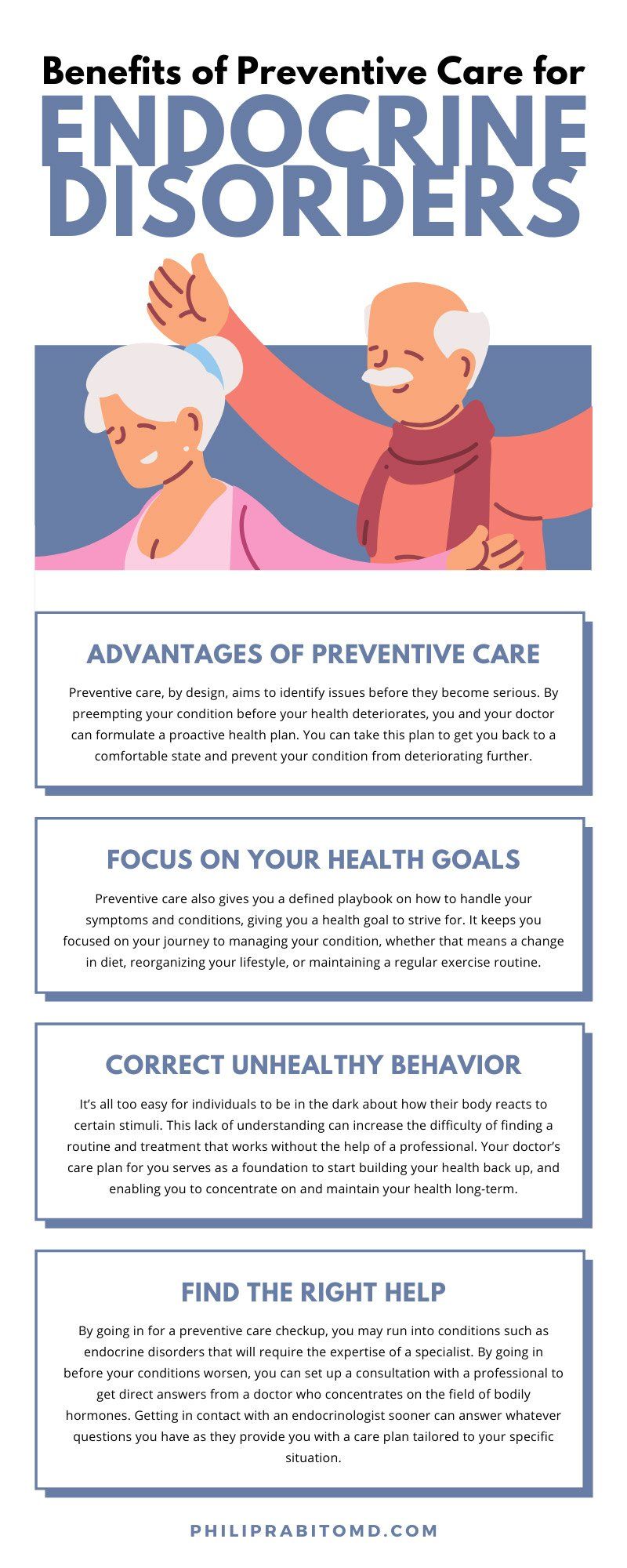
The human body can experience many different afflictions, but there can be signs before symptoms become worse. Knowing how to spot these signs will give you the opportunity to better control your condition and will aid you in avoiding any future complications. The benefits of preventive care for endocrine disorders are plenty, but you also need to understand what types of disorders to look out for and what your care may look like.
Try to be proactive about understanding what to expect from all aspects of the situation to make an informed decision regarding your care plan. Be an active participant in your health, take control of your situation, and know how and why you need to know how to manage your condition. Your doctor can only do so much; you need to know how to convey the issues you experience and have the willingness and knowledge to carry out any type of health care plan.
The Organs of the Endocrine System
The endocrine system is a complicated conglomerate of organs in the body that produce and regulate hormones. Those organs include:
- Thyroid
- Parathyroids
- Pancreas
- Adrenal glands
- Pineal gland
- Pituitary gland
- Ovaries
- Testicles
When these organs either produce too much or too little of a specific hormone in the bloodstream, it can have far-reaching effects across your entire body. It can affect many aspects of your well-being, whether it’s your mood, the texture of your hair, your body’s ability to burn fat, or your sleep patterns. Irregular hormone production will affect your body’s development and can significantly reduce your quality of life, and in some cases even pose a life-threatening health risk.
The Disorders of the Endocrine System
With the knowledge of the organs involved, you must also be aware of the disorders most common when dealing with the endocrine system. Each one can have a different underlying cause or produce differing symptoms, many of which most individuals mistake as separate conditions. But you need to understand what to look out for when seeking preventive care for your endocrine disorder.
Hyperthyroidism
The thyroid gland can produce too much thyroid hormone, which speeds up the body’s metabolic process. Your metabolism is what converts food into energy, thus powering the systems of the body. When your metabolism works too fast, you will experience a number of symptoms, including:
- Excessive weight loss
- Anxiety and nervousness
- Increased heart rate
- Difficulty sleeping
Hypothyroidism
Not to confuse it with the previous entry, hypothyroidism is the opposite in that your metabolic rate is significantly slower than it should be. This results in your body’s processes grinding to a halt, and the chief cause comes from the thyroid not producing enough thyroid hormone. Symptoms include:
- Excessive weight gain
- Chronic fatigue
- Dry skin
- Low tolerance to cold
Diabetes
The pancreas naturally secretes insulin into the bloodstream. This insulin then enables the your body’s cells to absorb the sugar, or glucose, in your blood. Sugar is a source of energy for the body, making you more active and alert, but diabetes reduces insulin production. This results in your blood sugar levels rising drastically. Symptoms include:
- Fatigue
- Frequent urination
- A sense of tingling or numbness in the hands and feet
- Extreme hunger
Adrenal Insufficiency
The adrenal glands produce the hormone cortisol, which affects the body in many ways, whether by means of metabolic regulation, controlling blood sugar levels, or reducing inflammation. When the adrenal glands produce too little, the most symptoms include:
- Chronic fatigue
- Loss of appetite
- Sudden weight loss
- Abdominal pain
Cushing’s Disease
Chemicals from the pituitary gland resulting in an overactive adrenal gland, creating too much cortisol in the bloodstream. Much like adrenal insufficiency, the chemical cortisol affects several aspects of the body, making it difficult to identify complications. But Cushing’s disease has a number of identifiable symptoms, which include:
- A fatty hump between the shoulder blades
- Rounded face
- High blood pressure
- Loss of bone density
Osteoporosis
Bone is living tissue, just like skin, and alterations to your chemical makeup can significantly weaken your bone structure. Specifically, the hormones estrogen and testosterone play critical roles in the strength of bones. As people age, the body produces less of these hormones, leading to a weakened skeletal structure as individuals grow older. Symptoms include:
- A stooped posture
- Back pain caused by a fractured vertebra
- Bones that break easily
- Loss of height
Advantages of Preventive Care
Preventive care, by design, aims to identify issues before they become serious. By preempting your condition before your health deteriorates, you and your doctor can formulate a proactive health plan. You can take this plan to get you back to a comfortable state and prevent your condition from deteriorating further.
Focus on Your Health Goals
Preventive care also gives you a defined playbook on how to handle your symptoms and conditions, giving you a health goal to strive for. It keeps you focused on your journey to managing your condition, whether that means a change in diet, reorganizing your lifestyle, or maintaining a regular exercise routine.
Correct Unhealthy Behavior
It’s all too easy for individuals to be in the dark about how their body reacts to certain stimuli. This lack of understanding can increase the difficulty of finding a routine and treatment that works without the help of a professional. Your doctor’s care plan for you serves as a foundation to start building your health back up, and enabling you to concentrate on and maintain your health long-term.
Find the Right Help
By going in for a preventive care checkup, you may run into conditions such as endocrine disorders that will require the expertise of a specialist. By going in before your conditions worsen, you can set up a consultation with a professional to get direct answers from a doctor who concentrates on the field of bodily hormones. Getting in contact with an endocrinologist sooner can answer whatever questions you have as they provide you with a care plan tailored to your specific situation.
Dr. Philip Rabito is an expert in the field of endocrinology. As a renowned endocrinologist in Manhattan, New York, he has extensive experience aiding patients in their journey of dealing with and managing their conditions.


